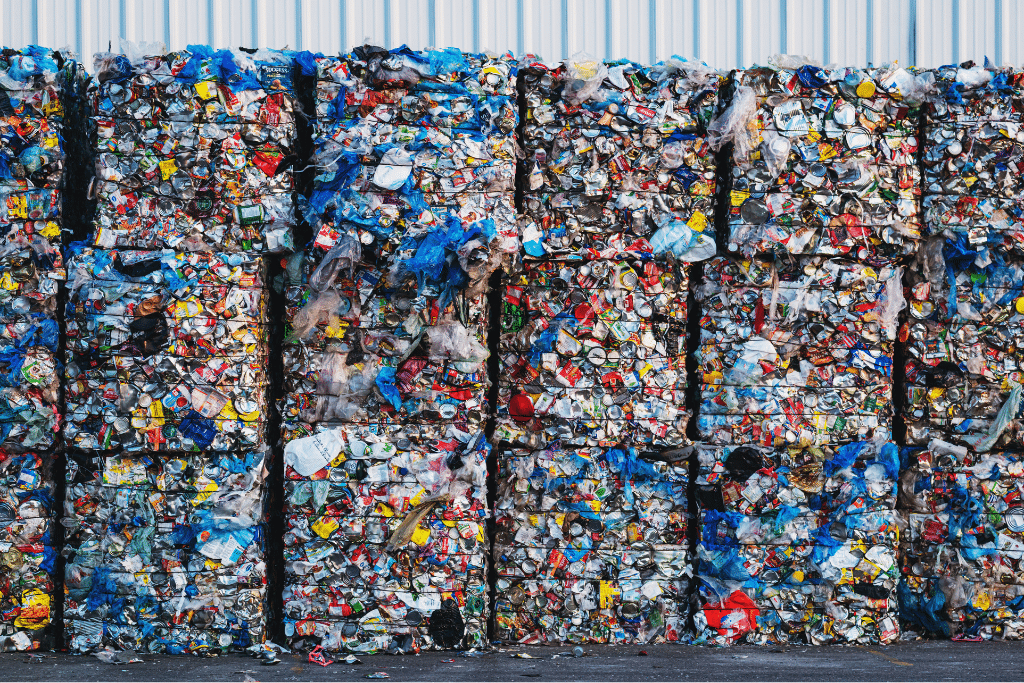With climate change, sustainability and waste reduction on the agenda of many businesses and corporate leaders, it is important for them to showcase their green credentials publicly and openly. In doing so, these businesses can offer insights into lesser known recycling opportunities in their internal operations. To celebrate Global Recycling Day 2024, which every year falls on March 14, Earth.Org republishes its guide for businesses to introduce recycling across their operations.
—
Hunt for Any Missed Opportunities
The theme for this year’s Recycling Week initiative, celebrated in the UK between October 16-22, 2023, was “The Big Recycling Hunt.” The initiative was a call on individuals and businesses to consider “missed captures”, in other words, items or materials that can be recycled but are not commonly identified as being recyclable.
With a special toolkit available and educational resources for teachers and communities to download and share to get local children involved, a part of this year’s campaign was to encourage businesses to share this message and get involved by highlighting the efforts they make throughout the year.
For CEOs and business leaders, any focused recycling campaign is a unique opportunity for them to prove to their customers, stakeholders, employees, and prospective clients the efforts they are making throughout the year to recycle materials. An ongoing initiative that is communicated between staff and shared online showcases their commitment and dedication to recycling as well as all the practical ways their business contributes to the wider recycling cause.
Rather than being a business or CEO that falls short, today’s companies should keep identifying and using materials in their manufacturing lines or any operational areas of the business that can be recycled. While some leading companies are doing well at reducing waste and recycling, other businesses need to dig deeper into their internal and external operations to look for missed opportunities and improve their sustainability.
Businesses Should Be Held Accountable
By shifting away from a linear approach where materials are thoughtlessly discarded, companies can step up and put greater efforts into adopting a circular model. A circular economy aims to eliminate waste by promoting the continual use of resources through strategies like recycling, reusing, repairing and remanufacturing products and materials. It is a regenerative system that minimises depletion of natural resources by using renewable energy and materials. The circular model is adopted by businesses keen to embed their commitment to sustainability and ESG values in a responsible and viable economic structure.
Strategies such as rethinking product design, enabling repair and reuse, and exploring ways to utilise by-products can help make this transformation. By-products are materials or waste produced during manufacturing or production processes as secondary outputs, in addition to the primary product. Common by-products across many industries include materials, such as:
- Scrap metal
- Wood shavings
- Food waste
- Plastic, or
- Paper packaging.
In many cases, these by-products can be identified, recovered and reused or recycled back into production processes or repurposed for other uses rather than being disposed of. For example, sawdust from woodworking can be used for fuel, composting or as a raw material for other products. Likewise, the remnants of ground coffee can be recycled as compost.
Utilising by-products also promotes a circular economy by reducing waste and the need for additional raw materials. With proper systems and technology for separation and collection, many by-products can be diverted from landfills and their economic value realised through recycling markets or creative reuse.
To show support and commit to a recycling agenda, businesses worldwide can incorporate effective by-product repurposing initiatives in addition to recycling policies to transition to a more circular operational approach. Additional national campaigns, like planting trees to mark 2023’ National Tree Week (from 25th November to 3rd December) can be pivotal in how businesses set themselves apart from other companies.
You might also like: Is Carbon Offset a Form of Greenwashing?
Why Should Businesses Care About Recycling?
There are many compelling reasons for companies to prioritise recycling:
- Cost savings: Proper recycling reduces waste collection and disposal costs. Reusing materials also lowers operating expenses.
- Environmental impact: Recycling reduces landfill waste, curbs carbon emissions, and helps preserve natural resources. This aligns with many other eco-friendly business practices.
- Compliance: Stricter regulations require more recycling and waste reporting. Getting policies in place now ensures more compliance across the board.
- Employee engagement: Staff appreciate working for environmentally aware employers. Successful recycling schemes rely on workforce participation.
- Reputation: Customers and stakeholders increasingly favour brands they use that demonstrate ethical, eco-friendly practices like recycling.
- Corporate social responsibility (CSR): CSR is a key consideration for many UK brands these days. By demonstrating active participation in ecological projects and emission reduction initiatives, consumers will take more notice.
The last two points highlighted above really illustrate how Recycle Week is a crucial time to drill down on how you, as a brand, are making an active difference in the fight against climate change. Not only can you promote your recycling efforts but you can also showcase other environmental projects and initiatives you have in the pipeline.
Furthermore, there is reason to believe that, by promoting your recycling efforts through evergreen content, you can earn your business much-needed online visibility, something which is hard to turn your nose up at in this competitive climate. In other words, keep telling your customers and stakeholders what you are doing that is making a positive environmental impact, as Justin Aldridge, Technical Director at SEO Agency Artemis Marketing explained to earth.org, “Companies recognising their role in combating climate change through recycling and other CSR efforts will gain a real competitive edge. From our experience, many of our clients are making the switch to more eco-friendly products, solutions and practices. Promoting sustainability initiatives online can also attract the attention of environmentally-minded prospects who come across this authoritative content during web searches.”
How Can Businesses Improve Recycling?
Recycling policies must be robust and organisation-wide to be truly effective. That can manifest in several different ways for businesses across sectors and regions, but as a loose, top-level guide, here are some top tips to improve your recycling efforts.
Companies can be looking for ways to boost their sustainability efforts and reduce waste. Here are some best practices businesses should consider making recycling a priority at the executive level. When company executives actively champion recycling initiatives, they can inspire other people in the company to follow suit. You can look at appointing a Chief Sustainability Officer or have the CEO directly spearhead programmes to underscore the importance of this issue.
Likewise, look at officially analysing your current waste streams and establish this as a key ongoing task. Appointing a member of staff and creating a senior role tasked with conducting a professional waste audit that monitors current rubbish levels, recycling and compost is a great idea, if finances permit. This will uncover any problem areas or gaps where more recycling could be implemented. Track the full lifecycle of materials from sourcing to disposal to pinpoint improvement opportunities.
In other ways, businesses can implement further changes, including:
- Provide training and resources: Educating staff is crucial for maximising recycling participation while minimising contamination from improper materials. Create clear signage and labels indicating what can/cannot be recycled. Ensure recycling bins are plentiful and located conveniently throughout facilities. Appoint employee recycling champions to promote protocols and serve as resources for questions.
- Monitor and report progress: Gather and track detailed data on recycling rates, participation levels, and contamination incidents. Share progress reports internally to highlight wins and identify areas needing improvement. Metrics and reporting provide accountability and visibility.
- Collaborate with suppliers: Work alongside vendors and suppliers to reduce packaging waste. Encourage take-back programs for recyclable packaging materials like pallets and shipping containers. Renegotiate contracts to include sustainability criteria.
- Engage employees: Boost participation by allowing employees to share feedback and suggestions. Incentivise success with rewards programmes recognising top contributors. Create competitions between departments or individuals for most materials recycled. Promote achievements through company communications.
- Lead By example: Implement initiatives that visibly demonstrate the company’s commitment to sustainability. For example, eliminate single-use plastics from cafeterias and meeting rooms. Showcase pilot projects and case studies for stakeholders to emulate. Use your influence to drive wider industry adoption of best recycling practices.
You might also like: What Is E-Waste Recycling and How Is it Done?
Recycling Ideas for Businesses
Ready to plan your company’s recycling push? Here are some great initiatives to consider:
- Provide boxes for staff to clear old paperwork for secure shredding and recycling.
- Run a ‘bring your own’ week by encouraging reusable cups, bottles, and containers instead of single-use disposables.
- Organise waste audits to assess contamination and identify target areas.
- Invite Continuing Professional Development (CPD) experts to present the latest advice on recycling regulations and best practices.
- Track and share monthly recycling statistics to maintain momentum.
- Organise competitions – challenge departments to increase recycling rates with rewards for winning teams.
- Share success stories – use newsletters, blogs and social media to broadcast recycling achievements.
Every business, large or small, can take meaningful steps to boost recycling. This Recycle Week, why not put your company’s waste under the microscope and launch new initiatives to reduce and reuse more? Our planet will thank you for it.
This article was originally published on November 3, 2023.
You might also like: Your Guide to Recycling Plastics
This story is funded by readers like you
Our non-profit newsroom provides climate coverage free of charge and advertising. Your one-off or monthly donations play a crucial role in supporting our operations, expanding our reach, and maintaining our editorial independence.
About EO | Mission Statement | Impact & Reach | Write for us


















